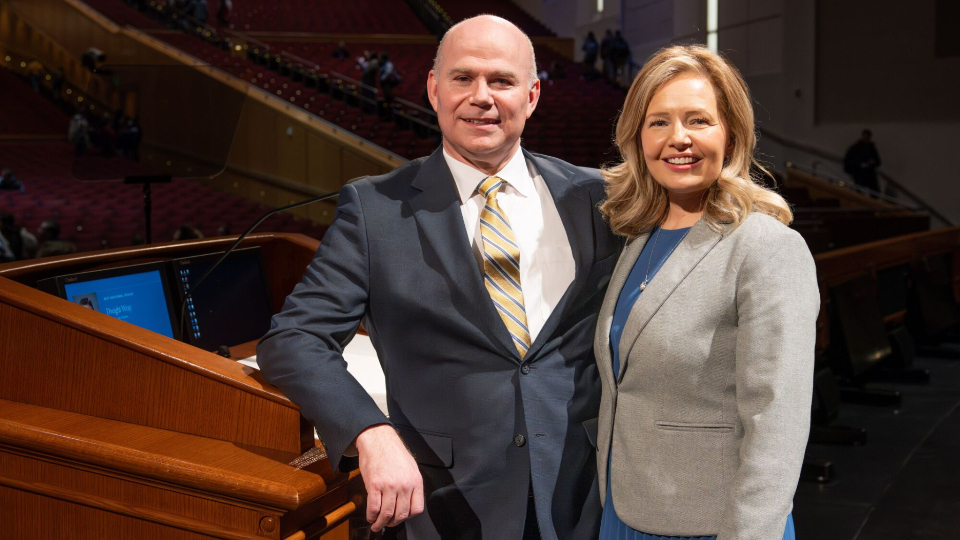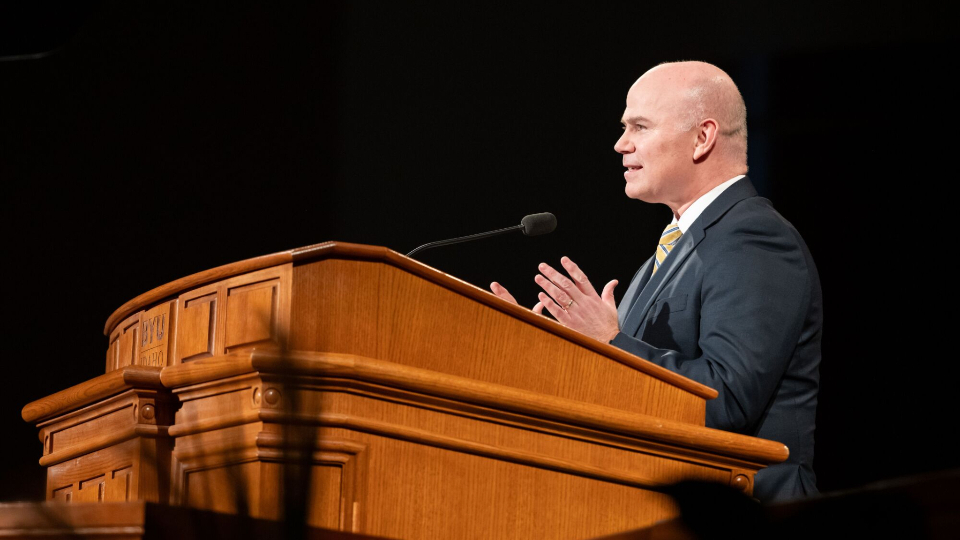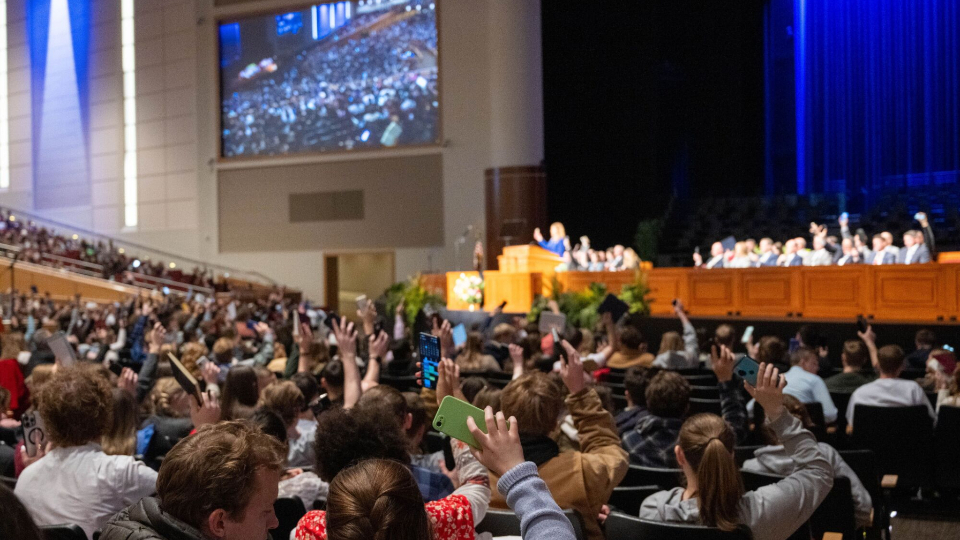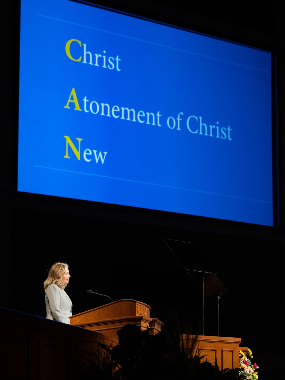
BYUI-Meredith
BYU–Idaho President Alvin F. Meredith III and his wife, Sister Jennifer Meredith, pose for a photo prior to speaking during the opening devotional for winter semester, on Tuesday, January 9, 2024. Photo by Lydia Rumsey, BYU–Idaho, courtesy of Church News. All rights reserved.This story appears here courtesy of TheChurchNews.com. It is not for use by other media.
By Rachel Sterzer Gibson, Church News
Florence Chadwick was a record-breaking long-distance open-water swimmer, the first woman to swim the 22 miles from Catalina Island to the California coast.
The day she first attempted it, the coastline was obscured by thick fog. After 16 hours, she asked to be taken out of the water. It turns out she gave up only a half mile from her goal.
Two months later, she tried again. She once again encountered thick fog but this time persevered and accomplished her goal. The difference? “While she swam, she kept a mental image of the shoreline in her mind. In other words, the thing that made the difference was that she kept the end in mind,” BYU–Idaho President Alvin F. Meredith III related during his devotional address on Tuesday, Jan. 9.
Speaking with his wife, Sister Jennifer Meredith, President Meredith, who also serves as a General Authority Seventy, welcomed those gathered in the I-Center in Rexburg, Idaho, as well as those listening online to a new semester in the new year.

BYUI-Meredith
BYU–Idaho President Alvin F. Meredith III speaks during the campus devotional held in the BYU–I Center in Rexburg, Idaho, on Tuesday, January 9, 2024. Photo by Lydia Rumsey, BYU–Idaho, courtesy of Church News. All rights reserved.President Meredith shared how President Russell M. Nelson, in his first public address as the Prophet and again in his most recent general conference talk, encouraged individuals to “begin with the end in mind.”
“So today, I wish to talk about how the concept of beginning with the end in mind applies to being both a leader and a disciple of Jesus Christ,” President Meredith said.
Leadership
“At its core, beginning with the end in mind is about having a vision, a clear understanding of where you want to go or what you want to accomplish,” President Meredith explained.
Proverbs 29:18 states that “where there is no vision, the people perish.”
In other words, great leaders have a clear vision of the end of any endeavor — the potential of what can be accomplished, President Meredith said.
President Meredith quoted the late Church President Thomas S. Monson who spoke of the character Alice in Lewis Carroll’s novel “Alice’s Adventures in Wonderland.” In the book, Alice comes to a crossroads and asks the Cheshire Cat, “Which path should I follow?”
The cat replies, “That depends where you want to go. If you do not know where you want to go, it doesn’t matter which path you take.”
President Monson then said, “Unlike Alice, we know where we want to go, and it does matter which way we go, for the path we follow in this life leads to our destination in the next life” (“Choices”, April 2016 general conference).
Be thoughtful and intentional now about creating a vision of what being a leader at home looks like, President Meredith encouraged students. “How will you treat those in your home? What kind of spouse do you want to be? What kind of parent? When it comes to leading in the Church, irrespective of calling, how can you lead in the cause to gather Israel? How can you do that on this side of the veil? What can you do to gather Israel on the other side of the veil? Ask those same questions about being a leader in your communities, your workplace, and all your other interactions with people.”

BYUI-Meredith
BYU–Idaho students enter the BYU–I Center on the Rexburg, Idaho, campus for the opening devotional for winter semester featuring BYU–Idaho President Alvin F. Meredith III and his wife, Sister Jennifer Meredith, on Tuesday, January 9, 2024. Photo by Mike Lewis, BYU–Idaho, courtesy of Church News. All rights reserved.Discipleship
Trying to “keep the end in mind” can help individuals keep perspective in the midst of trials and increase resolve in the face of temptation, President Meredith said, because they can be assured that in the end, all will be well.
Elder Dale G. Renlund of the Quorum of the Twelve Apostles taught, “In the eternities, Heavenly Father and Jesus Christ will resolve all unfairness. … Your faith in Heavenly Father and Jesus Christ will be rewarded more than you can imagine” (“Infuriating Unfairness,” April 2021 general conference).
In a speech at Brigham Young University many years ago, President Nelson taught, “in your important race [of life], I would plead for you to begin with the end in mind. To assist you in defining that end, I would ask you this simple question: What would you like said about you at your funeral?”
One writer observed that there are two sets of virtues to pursue in life: résumé virtues and eulogy virtues, President Meredith said. Résumé virtues further a person’s career and temporal pursuits, such as grades, a degree and work experience. Eulogy virtues, however, “are those that are talked about at your funeral. Were you kind and encouraging to others? Were you selfless with your time and resources? Did you have faith and build faith and others?”
While BYU–Idaho wants all graduates to leave with a great résumé, President Meredith said, “Most importantly, we hope that you will become lifelong disciples of Jesus Christ. We hope that you will develop those eulogy virtues to prepare you for your eternal destiny. We hope and pray that that end, your eternal destiny, will give you hope and guide you and your choices in this life.”

BYUI-Meredith
Students hold up their mobile devices in the BYU–I Center during a devotional with BYU–Idaho President Alvin F. Meredith III and his wife, Sister Jennifer Meredith, on Tuesday, January 9, 2024. Photo by Mike Lewis, BYU–Idaho, courtesy of Church News.All rights reserved.C.A.N.
While their family was living in Singapore, Sister Meredith soon noticed that when asked a yes/no question, Singaporeans would usually respond with “can” or “cannot.”
For example, “Do you sell adapters?” “Can.” “Does your store have parking?” “Cannot.”

BYUI-Meredith
Sister Jennifer Meredith speaks during the campus devotional held in the BYU–I Center in Rexburg, Idaho, on Tuesday, January 9, 2024. Photo by Tanner Brown, BYU–Idaho, courtesy of Church News.All rights reserved.Perhaps because she appreciated hearing “can,” Sister Meredith said, she soon started noticing the tiny three-letter word throughout the scriptures, especially in connection with the Savior.
She then shared what the letters “C,” “A” and “N” help her remember.
“First, ‘C’ reminds me of Christ; a reminder to follow Him and the words of His living prophets.”
The letter “A” reminds her of the Atonement of Jesus Christ, she said.
Echoing the words of President Dallin H. Oaks, First Counselor in the First Presidency, Sister Meredith said, “Because of Jesus Christ and His Atonement, when we fall short in this life, we can repent and rejoin the covenant path that leads to what our Heavenly Father desires for us.”
Lastly, the letter “N” reminds her of “new” or, as Alma the Younger taught, becoming “new creatures” or “changed from their carnal and fallen state, to a state of righteousness, being redeemed of God” (see Mosiah 27:25-26).
In beginning a new year and a new semester, Sister Meredith encouraged students to remember, “We can.”
She concluded, “We can do well in our classes. We can heal a rift. We can be comforted in times of grief. We can be mindful of the words we speak. We can repent. We can overcome weaknesses and stretch ourselves in ways far beyond what we think is possible. Through Christ and the blessings of the Atonement of Christ, we can become new creatures.”
Copyright 2023 Deseret News Publishing Company.